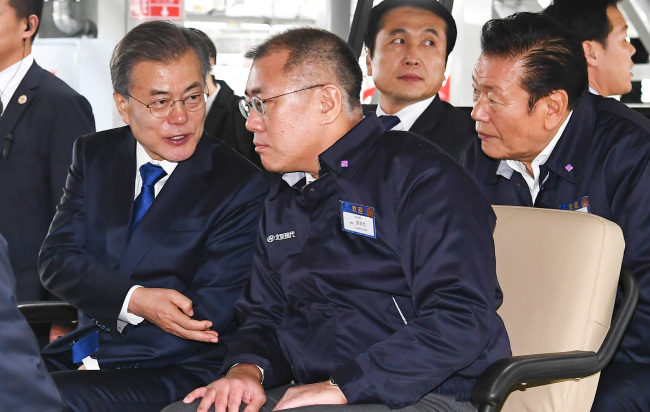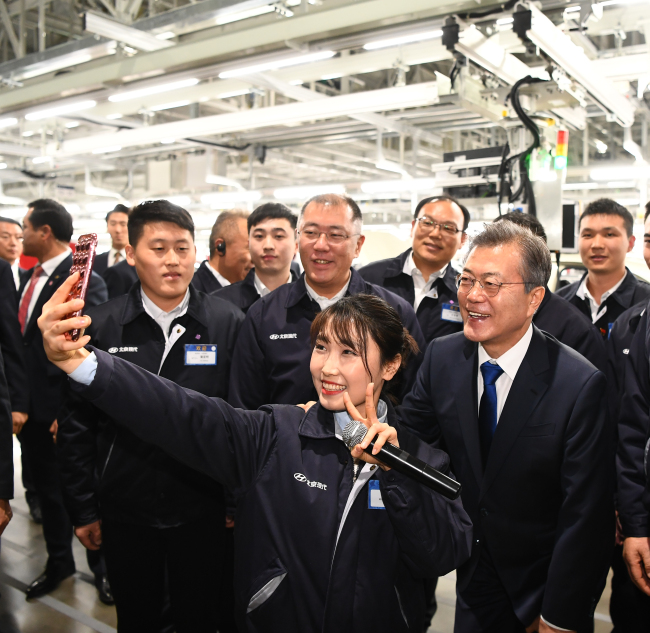Praising Beijing Hyundai Motor as an example of growth and symbolic of economic cooperation between South Korea and China, President Moon Jae-in pledged support to remove any barriers to the operation of the joint venture during his visit to a plant in Chongqing, southwest China, Saturday.
Moon’s visit to the Hyundai plant came in light of slowly recovering sentiment toward South Korean businesses in China, following hostilities over diplomatic tensions regarding the deployment of the US’ Terminal High Altitude Area Defense anti-missile system in Korea.
"I believe that (the latest) summit talks (with China’s President Xi Jinping) have removed the external difficulties (that the company) had faced. Even if there are such factors that arise in the future, the government will take the lead in resolving them,” Moon said in a speech before South Korean and Chinese officials and employees of Hyundai’s fifth Chinese plant. Hyundai Vice Chairman Chung Eui-sun was on hand as well to guide Moon through the facilities.
Moon’s visit to the Hyundai plant came in light of slowly recovering sentiment toward South Korean businesses in China, following hostilities over diplomatic tensions regarding the deployment of the US’ Terminal High Altitude Area Defense anti-missile system in Korea.
"I believe that (the latest) summit talks (with China’s President Xi Jinping) have removed the external difficulties (that the company) had faced. Even if there are such factors that arise in the future, the government will take the lead in resolving them,” Moon said in a speech before South Korean and Chinese officials and employees of Hyundai’s fifth Chinese plant. Hyundai Vice Chairman Chung Eui-sun was on hand as well to guide Moon through the facilities.

Moon also expressed hope that cooperation between Seoul and Beijing will continue to expand beyond conventional vehicles to electric, hydrogen-fueled, autonomous, eco-friendly and next-generation cars in the future.
The Beijing Hyundai Motor plant in Chongqing completed construction in March and can manufacture up to 300,000 vehicles a year. It employees some 1,300 workers.
While President Moon’s overall four-day state visit to China ended with mixed reactions on whether he was properly welcomed or returned with tangible results, his on-site visit to the Hyundai plant was deemed significant for the business community here, as the company, along with other Korean businesses operating in China, has been hit hard by the diplomatic strain and needed the political boost.
Hyundai has been suffering from plunging sales in China, which only recently began to show signs of recovery.
Hyundai and Kia have sold a combined 969,553 vehicles from January to November this year, down 38.2 percent from the same period last year.
The number has improved on-month by 18.4 percent, marking 145,015 in November compared to 122,521 from October, but still lags behind November 2016 by 29.8 percent, when sales marked 206,512.
Industry watchers point out that Hyundai’s sales decline followed by the low operation rate at local factories have led to revenue drops at partner firms and dealerships, and will require more time for a full recovery.
In a welcoming speech, Xu Heyi, chairman of BAIC Motor Corporation, the Chinese automaker with a 50 percent share of Beijing Hyundai Motor, noted that it was the 15th anniversary of the joint venture, adding the groups would continue to grow based on global strategies and brand enhancement.

During his visit to the factory, Moon paid keen interest to Hyundai’s Elantra EV that began sales in China in August this year, asking how the Chinese government was providing support and how charging facilities were being set up. Moon also sat with officials from Hyundai and other partner firms to listen to their difficulties.
Moon’s visit was welcomed by local employees, with some of them requesting pictures together, according to Cheong Wa Dae pool reports.
Separated into six groups, Moon and his delegation rode electric carts to tour the factory that produces the All New Reina. Chung was also seen sitting next to and conversing with the president.
Chung, who also previously accompanied Moon on his visit to the US, led various events during the president’s visit to China as part of the business delegation.
On Thursday, during a trade partnership event held at the China National Convention Center in Beijing, Chung personally introduced Hyundai’s next-generation hydrogen fuel cell electric car, the Sonata Plug-in Hybrid, as well as the new ix35.
Moon took a test-ride in the next-generation hydrogen fuel cell electric car, which was being unveiled in China for the first time and has yet to be launched to the global market.
To counter slow business in China, Hyundai has created a 100-strong task force to come up with measures to boost sales, and plans to give greater authority to local operation heads for higher flexibility in management next year.
Aside from launching the All New Reina and ix35 recently, Beijing Hyundai Motor has participated in some 40 regional motor shows and offered free-of-charge checkup services to customers.
It also opened Hyundai Motor Studio Beijing last month to promote future strategies.
Past South Korean presidents have also made a point of visiting Hyundai’s factories in China on official trips, including late President Roh Moo-hyun and former presidents Lee Myung-bak and Park Geun-hye, to Beijing Hyundai Motor’s first, second and third plants, respectively.
By The Korea Herald staff (khnews@heraldcorp.com)
-
Articles by Korea Herald



![[Herald Interview] 'Amid aging population, Korea to invite more young professionals from overseas'](http://res.heraldm.com/phpwas/restmb_idxmake.php?idx=644&simg=/content/image/2024/04/24/20240424050844_0.jpg&u=20240424200058)















![[Today’s K-pop] Kep1er to disband after 2 1/2 years: report](http://res.heraldm.com/phpwas/restmb_idxmake.php?idx=642&simg=/content/image/2024/04/25/20240425050792_0.jpg&u=)